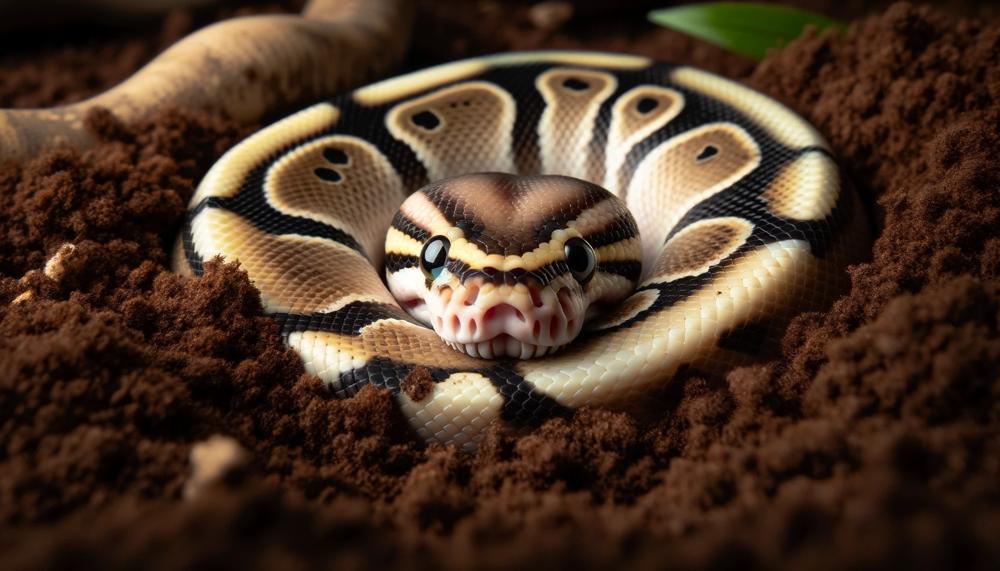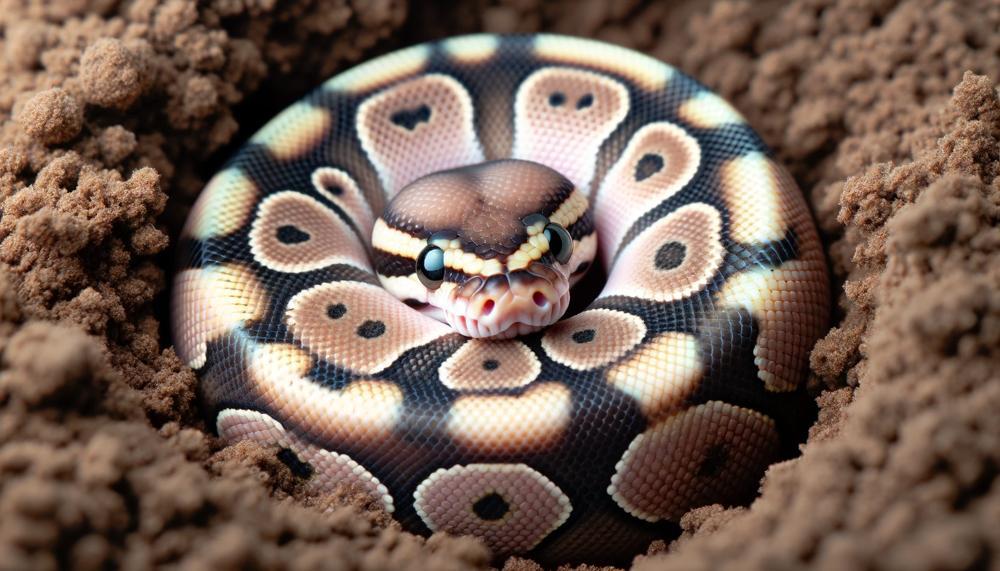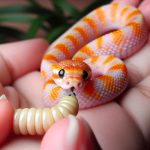Have you ever pondered the impressive burrowing abilities of ball pythons? Or perhaps you’ve witnessed your own slithery companion disappear into the depths of their substrate, leaving you both mesmerized and slightly concerned.
Burrowing is a natural behavior for these serpentine creatures and serves numerous important purposes in their lives. In this blog post, we will delve into the captivating world of ball python burrowing and uncover intriguing facts about this unique behavior.
So, do ball pythons burrow?
Ball pythons do really burrow. They spend the most of their time in hiding—in burrows, under rocks, or other locations. Since they are nocturnal snakes, the night is when they are most active. They wait for their prey to approach them since they are also ambush predators.
Ball pythons kept in captivity need to have access to a hiding place where they may burrow. The snake should be able to fully coil up within the hide box. Additionally, the environment should be damp and dark to aid in the snake’s sense of security.
The causes for ball pythons’ burrowing are many. To conceal from predators is one of the reasons. To control their body temperature is an additional factor. Ball pythons will burrow into the earth in the wild to stay warm on chilly nights and to cool down on hot days. Ball pythons in captivity are also able to control their body temperature with the use of their hide box.
It’s crucial to offer your prospective ball python a hide box where they may dig burrows if you decide to purchase one. They will be able to control their body temperature and feel more safe as a result.
So, grab yourself a cup of tea (or coffee, if that’s more your cup of tea) and join us as we embark on an enlightening journey through the fascinating world of ball python burrowing.
Contents
Is it Normal for Ball Pythons to Burrow?
Burrowing is a natural behavior for wild Ball Pythons as it serves as a way of protecting themselves from predators and extreme temperatures. However, burrowing behavior in pet Ball Pythons is uncommon and may indicate a problem with their care.
There are various reasons why ball pythons may burrow, and it is crucial to address these issues to ensure the snake’s well-being and health.
Reasons for Burrowing:
- Changes in tank setup: Alterations in the snake’s environment, such as rearranging decorations or adding new items, can cause stress and lead to burrowing behavior.
- Temperature fluctuations: Ball Pythons are sensitive to changes in temperature and may burrow to regulate their body heat. High temperatures can result in overheating, while low temperatures can trigger hibernation behaviors.
- Low humidity: Inadequate humidity levels prevent proper shedding and hydration, causing discomfort and leading to burrowing behavior as a way of seeking relief.
- Health problems: Parasites, respiratory infections, and other health issues can cause discomfort and excessive burrowing as a means of alleviating symptoms.
- Stress: Factors like frequent handling, incorrect light cycles, or noisy environments can be stressful for Ball Pythons and trigger burrowing behavior.
Is it Normal Behavior?
While wild Ball Pythons often burrow, it is not a common behavior in pet snakes unless there is an underlying issue with their care. Inappropriate temperature and humidity levels, inadequate hiding opportunities or space, and other stressors can all contribute to burrowing behavior.
It is crucial to provide proper care and address any potential issues promptly to prevent excessive burrowing in pet Ball Pythons.
Why Do Ball Pythons Burrow?
Ball Pythons are known for their docile nature, but they also have specific needs that must be met for them to thrive. One of these needs is having a secure and comfortable environment. When these needs are not met, Ball Pythons may exhibit burrowing behavior as a way of seeking comfort and security.
In the wild, Ball Pythons burrow for protection from predators and extreme temperatures. In captivity, they may do the same if they feel threatened or uncomfortable. This can be due to various reasons, including changes in their tank setup, temperature fluctuations, low humidity levels, health problems, or stress.
How to Prevent Excessive Burrowing?
To prevent excessive burrowing in pet Ball Pythons, it is crucial to provide proper care and address any potential issues promptly. This includes maintaining appropriate temperature and humidity levels, ensuring adequate hiding opportunities and space, and minimizing stressors in their environment.
Regularly monitoring your snake’s behavior and making adjustments to their care as needed can help prevent excessive burrowing. Additionally, providing enrichment activities such as hiding spots and different textures in their tank can help keep them mentally stimulated and reduce stress.
6 Reasons Why Your Ball Python is Burying Itself in Substrate
Ball pythons have a natural instinct to burrow, which helps them survive in the wild. In captivity, this behavior can also occur due to various reasons such as improper temperature and humidity levels, stress, or health issues.
Let’s delve deeper into these potential factors.
| Factors that may affect how long a baby ball python can stay hungry: | Impact on hunger timeline: |
| The snake’s health | A sick or weak baby ball python may not be able to go as long without eating compared to a healthy snake. If you notice any signs of illness in your snake, such as lethargy or weight loss, it is important to consult with a veterinarian. |
| Temperature and humidity levels | Ball pythons are highly sensitive to changes in temperature and humidity. If these levels are not within the appropriate range, they may refuse to eat or have difficulty digesting their food. |
| Size of the snake | Baby ball pythons are smaller and have less body fat than adult ball pythons. This means they may not be able to go as long without eating before it becomes a concern for their health and well-being. |
| Recent feeding schedule | If a baby ball python has recently eaten, they may not be hungry for longer than usual. It is important to keep track of when your snake last ate to determine if their hunger strike is due to their natural behavior or another factor. |
| Stress or changes in environment | Stress can cause a baby ball python to refuse food, such as moving to a new enclosure or introducing new tank mates. It is important to give your snake time to adjust and provide a calm and comfortable environment. |
In summary, ball pythons have an inherent urge to burrow for survival. In captivity, this behavior may also manifest due to various husbandry and care-related factors.
Can You Stop Your Ball Python From Burrowing?
While it may not be entirely preventable to stop your ball python from burrowing, there are methods you can utilize to manage and decrease this behavior.
- Select appropriate substrate: Choosing the correct substrate is crucial in preventing excessive burrowing. Avoid using substrates such as calci-sand, walnut shells, and wood chips as they do not retain moisture well and can be harmful to your pet’s health. Instead, opt for aspen shavings, cypress mulch, or coconut fiber, which allows for burrowing while maintaining optimal moisture levels.
- Create a suitable environment: Ball pythons burrow to regulate their body temperature and seek security. It is essential to provide an appropriate environment with temperature gradients and proper humidity levels to prevent excessive burrowing and potential health issues.
- Offer hiding spots: In the wild, ball pythons seek shelter in established burrows. In captivity, providing hiding spots such as caves or logs can imitate this innate behavior and give a sense of security to your pet.
- Monitor stress levels: Excessive burrowing can also be a sign of stress in ball pythons. Factors such as improper temperatures or humidity levels, lack of hiding spots, excessive handling, overcrowding, or loud noises can cause stress in your pet. Watching your pet’s behavior and addressing any potential stressors can help reduce burrowing.
- Regular vet checks: Signs of illness such as loss of appetite, weight loss, labored breathing, incomplete shedding, increased aggression, respiratory sounds, and nasal discharge can also lead to excessive burrowing. Regular vet checks can help identify any possible health issues and address them promptly.
Why is Your Ball Python Not Burrowing?
There are multiple methods to determine if your ball python is not burrowing and potential causes behind it. Some indications that your ball python may not be burrowing include:
- Lack of disturbance in the substrate: If you observe no signs of substrate disturbance in your ball python’s enclosure, it could indicate that your snake is not burrowing. This may be noticeable if you have previously witnessed your snake burrowing or if you have provided suitable substrate for burrowing.
- Increased time spent in hiding places: Ball pythons often burrow to feel secure and safe. If you notice that your snake is spending more time in its hiding spots than usual, it could be a sign that it is not burrowing.
- Restlessness or heightened activity: Burrowing behavior can also serve as a way for ball pythons to cope with stress. If your snake is not burrowing, it may display restlessness or increased activity as it tries to manage stress or anxiety.
- Changes in humidity levels: To maintain proper shedding and overall health, ball pythons require a specific level of humidity in their environment. If the humidity levels suddenly change or fluctuate, it could discourage your snake from burrowing.
There are various reasons why your ball python may not be burrowing, including:
- Inappropriate substrate: As mentioned earlier, ball pythons need a specific type of substrate to create burrows. If the substrate is too hard or compact, it may deter your snake from attempting to burrow.
- Lack of hiding spots: In the wild, ball pythons are opportunistic burrowers and will use any hiding spots they can find. In captivity, providing suitable hiding places can help fulfill their natural instinct to burrow.
- Stress or anxiety: Changes in their environment, handling, or other factors can cause ball pythons to become stressed or anxious. This may result in decreased burrowing behavior as they seek out other coping mechanisms.
- Illness or injury: If your ball python is not burrowing and also displays other signs of health problems, it is vital to consult a veterinarian. Illness or injury could be preventing your snake from engaging in its natural burrowing behavior.
To ensure the health and well-being of your ball python, it is crucial to closely monitor its behavior and environment.
Where Do Ball Pythons Live in the Wild?
Ball pythons are widespread in the wild, inhabiting various regions from West and Central Africa to parts of the Middle East.
They can be found in a diverse range of habitats, including savannas, grasslands, forests, and even semi-desert areas. However, it appears that these snakes have a preference for specific types of environments.
Terrestrial or Semi-Arboreal Habits:
As mentioned earlier, male ball pythons tend to exhibit more semi-arboreal behaviors, while females lean towards terrestrial behaviors.
This suggests that the gender of the python may influence its habitat preference.
Underground Hiding Places:
In their natural habitat, ball pythons tend to seek out mammal burrows and other underground hiding places.
These provide them with essential shelter and protection from predators, as well as a place to aestivate during drier periods.
Substrate:

The type of substrate is also crucial for ball pythons in the wild. These snakes require a substrate that allows them to burrow and hide, such as sand or soil.
Unsuitable substrate can cause stress and other health issues for ball pythons.
Hiding Spots:
In addition to seeking out underground hiding places, ball pythons also require an adequate number of hiding spots above ground.
These could include rock crevices, hollow logs, or dense vegetation. These hiding spots not only provide protection but also create a sense of security for the snakes.
Conclusion
In conclusion, ball pythons possess a natural inclination to burrow for their survival and comfort.
This instinctual behavior plays a crucial role in their lives, whether in the wild or in captivity. While it may be disconcerting to witness your pet snake disappear into its substrate, fear not.
By understanding the reasons behind ball python burrowing and creating an optimal environment for them, we can ensure their happiness and dispel any misunderstandings about this fascinating behavior.






